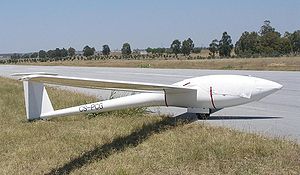- Glaser-Dirks DG-200
-
DG-200 A DG-200/17C sporting the shorter 15 m span (Évora, Portugal) Role 15 metre class sailplane National origin Germany Manufacturer Glaser-Dirks First flight 1977 Number built 192 The DG-200 is a 15 metre class glider built by Glaser-Dirks. It first flew in 1977. Wingtip extensions to 17 metres were offered in 1978. Later enhancements included a single-piece canopy, a carbon-fibre wing spar and a change in the wing profile. A total of 192 DG-200 were built.
It belongs to the same generation as the Rolladen-Schneider LS3, Alexander Schleicher ASW 20, Schempp-Hirth Mini-Nimbus, Eiri-Avion PIK-20 and Glasflügel Mosquito.
The DG-400 motor glider was derived from the DG-200/17C.
Variants
- DG-200
- The original production model
- DG-202
- Improved model with large one-piece canopy replacing the split type of the DG-200 and other refinements highlighted by customer feedback and flight testing.
- DG-200/17
- The Dg-200 with optional wingtip extensions to 17m span
- DG-202/17
- The Dg-202 with optional wingtip extensions to 17m span
- DG-202/17C
- The Dg-200 with optional wingtip extensions to 17m span and carbon fibre spars
Specifications (15 metre wing)
General characteristics
- Crew: One pilot
- Capacity: 130 kg (290 lb) water ballast
- Length: 7.00 m (23 ft 0 in)
- Wingspan: 15.00 m (49 ft 3 in)
- Height: 1.4 m (4 ft 7 in)
- Wing area: 10.0 m2 (107.6 ft2)
- Aspect ratio: 22.5
- Empty weight: 238 kg (525 lb)
- Gross weight: 450 kg (992 lb)
Performance
- Maximum speed: 270 km/h (168 mph)
- Maximum glide ratio: 42
- Rate of sink: 0.59 m/s (116 ft/min)
References
Aircraft produced by Glaser-Dirks Flugzeugbau, later DG Flugzeugbau Lists relating to aviation General Aircraft (manufacturers) · Aircraft engines (manufacturers) · Airlines (defunct) · Airports · Civil authorities · Museums · Registration prefixes · Rotorcraft (manufacturers) · TimelineMilitary Accidents/incidents Records Categories:- German sailplanes 1970–1979
- Glider aircraft
- DG Flugzeugbau aircraft
- 1970s aircraft stubs
Wikimedia Foundation. 2010.

